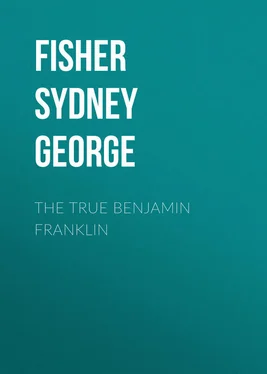Sydney Fisher - The True Benjamin Franklin
Здесь есть возможность читать онлайн «Sydney Fisher - The True Benjamin Franklin» — ознакомительный отрывок электронной книги совершенно бесплатно, а после прочтения отрывка купить полную версию. В некоторых случаях можно слушать аудио, скачать через торрент в формате fb2 и присутствует краткое содержание. Жанр: История, foreign_antique, foreign_prose, Биографии и Мемуары, на английском языке. Описание произведения, (предисловие) а так же отзывы посетителей доступны на портале библиотеки ЛибКат.
- Название:The True Benjamin Franklin
- Автор:
- Жанр:
- Год:неизвестен
- ISBN:нет данных
- Рейтинг книги:4 / 5. Голосов: 1
-
Избранное:Добавить в избранное
- Отзывы:
-
Ваша оценка:
- 80
- 1
- 2
- 3
- 4
- 5
The True Benjamin Franklin: краткое содержание, описание и аннотация
Предлагаем к чтению аннотацию, описание, краткое содержание или предисловие (зависит от того, что написал сам автор книги «The True Benjamin Franklin»). Если вы не нашли необходимую информацию о книге — напишите в комментариях, мы постараемся отыскать её.
The True Benjamin Franklin — читать онлайн ознакомительный отрывок
Ниже представлен текст книги, разбитый по страницам. Система сохранения места последней прочитанной страницы, позволяет с удобством читать онлайн бесплатно книгу «The True Benjamin Franklin», без необходимости каждый раз заново искать на чём Вы остановились. Поставьте закладку, и сможете в любой момент перейти на страницу, на которой закончили чтение.
Интервал:
Закладка:
A very sharp insight into human nature is shown in this passage, and it is not surprising that the boy who wrote it afterwards became a mover of men. His mind was led to the subject by being employed to print a book which was very famous in its day, called “The Religion of Nature Delineated.” He disliked its arguments, and must needs refute them by his pamphlet “Liberty and Necessity,” which was certainly a most vigorous mental discipline for him, although he was afterwards dissatisfied with its negative conclusions.
Obscure and poor as he was, he instinctively seized on everything that would contribute to his education and enlargement of mind. He made the acquaintance of a bookseller, who agreed for a small compensation to lend him books. His pamphlet on Liberty and Necessity brought him to the notice of Dr. Lyons, author of “The Infallibility of Human Judgment,” who took him to an ale-house called The Horns, where a sort of club of free-thinkers assembled. There he met Dr. Mandeville, who wrote “The Fable of the Bees.” Lyons also introduced him to Dr. Pemberton, who promised to give him an opportunity of seeing Sir Isaac Newton; but this was never fulfilled.
The conversation of these men, if not edifying in a religious way, was no doubt stimulating to his intelligence. He had brought over with him a purse made of asbestos, and this he succeeded in selling to Sir Hans Sloane, who invited him to his house and showed him his museum of curiosities.
He says of the asbestos purse in his Autobiography that Sir Hans “persuaded me to let him add it to his collection, for which he paid me handsomely.” But the persuasion was the other way, for the letter which he wrote to Sir Hans, offering to sell him the purse, has been discovered and printed.
Even the woman he lodged with contributed to his education. She was a clergyman’s daughter, had lived much among people of distinction, and knew a thousand anecdotes of them as far back as the time of Charles II. She was lame with the gout, and, seldom going out of her room, liked to have company. Her conversation was so amusing and instructive that he often spent an evening with her; and she, on her part, found the young man so agreeable that after he had engaged a lodging near by for two shillings a week she would not let him go, and agreed to keep him for one and sixpence. So the future economist of two continents enlarged his knowledge and at the same time reduced his board to thirty-seven cents a week.
He certainly needed all the money he could get, for he was helping to support Ralph, who was trying to become a literary man and gradually degenerating into a political hack. Ralph made the acquaintance of a young milliner who lodged in the same house with them. She had known better days and was genteelly bred, but before long she became Ralph’s mistress.
Ralph went into the country to look for employment at school-teaching, and left his mistress in Franklin’s care. As she had lost friends and employment by her association with Ralph, she was soon in need of money, and borrowed from Franklin. Presuming on her dependent position, he attempted liberties with her, and was repulsed with indignation. Ralph hearing of it on his return, informed him that their friendship was at an end and all obligations cancelled. This precluded Franklin’s hope of being repaid the money he had lent, but it had the advantage of putting a stop to further lending.
For a year and a half he lived in London, still keeping up his reading, but also going to the theatres and meeting many odd characters and a few distinguished ones. It was an experience which at least enlarged his mind if it did not improve his morals. He eventually became very tired of London, longing for the simple pleasures and happy days he had enjoyed in Pennsylvania, and he seized the first opportunity to return. Mr. Denham, the Quaker merchant who had come over in the same ship with him, was about to return, and offered to employ him as clerk. He eagerly accepted the offer, helped his benefactor to buy and pack his supply of goods, and landed again in Philadelphia in the autumn of 1726.
Keith was no longer governor. Miss Read, despairing of Franklin’s return, had yielded to the persuasions of her family and married a potter named Rogers, and Keimer seemed to be prospering. But the young printer was in a business that he liked. He was devoted to Mr. Denham, with whom his prospects were excellent, and he thought himself settled at last. In a few months, however, both he and Mr. Denham were taken with the pleurisy. Mr. Denham died, and Franklin, fully expecting to die, made up his mind to it like a philosopher who believed that there was nothing beyond the grave. He was rather disappointed, he tells us, when he got well, for all the troublesome business of resignation would some day have to be done over again.
Finding himself on his recovery without employment, he went back again to work at his old trade with Keimer, and before long was in business for himself with a partner. He had never paid Mr. Vernon the money he had collected for him; but, fortunately, Mr. Vernon was easy with him, and, except for worrying over this very serious debt and the loss of Miss Read, Franklin began to do fairly well, and his self-education was continued in earnest.
It was about this time that he founded the club called the Junto, which he has described as “the best school of philosophy, morality, and politics that then existed in the province.”
This description was true enough, but was not very high praise, for at that time Pennsylvania had no college, and the schools for children were mostly of an elementary kind. Franklin, in making this very sweeping assertion, may have intended one of his deep, sly jokes. It was the only school of philosophy in the province, and in that sense undoubtedly the best.
It was a sort of small debating club, in which the members educated one another by discussion; and Franklin’s biographer, Parton, supposes that it was in part suggested by Cotton Mather’s benefit societies, which were well known in Boston when Franklin was a boy.
The first members of the Junto were eleven in number, young workmen like Franklin, four of them being printers. The others were Joseph Brientnal, a copier of deeds; Thomas Godfrey, a self-taught mathematician, inventor of the quadrant now known as Hadley’s; Nicholas Scull; William Parsons, a shoemaker; William Maugridge, a carpenter; William Coleman, a merchant’s clerk; and Robert Grace, a witty, generous young gentleman of some fortune. The Junto was popularly known as the Leather-Apron Club, and Franklin has told us in his Autobiography of its methods and rules:
“We met on Friday evenings. The rules that I drew up required that every member, in his turn, should produce one or more queries on any point of Morals, Politics, or Natural Philosophy, to be discuss’d by the company; and once in three months produce and read an essay of his own writing, on any subject he pleased. Our debates were to be under the direction of a president, and to be conducted in the sincere spirit of inquiry after truth, without fondness for dispute, or desire of victory; and, to prevent warmth, all expressions of positiveness in opinions, or direct contradiction, were after some time made contraband, and prohibited under small pecuniary penalties.”
From other sources we learn that when a new member was initiated he stood up and, with his hand on his breast, was asked the following questions:
“1. Have you any particular disrespect to any present member? Answer: I have not.
“2. Do you sincerely declare that you love mankind in general of what profession or religion soever? Answer: I do.
“3. Do you think any person ought to be harmed in his body, name, or goods for mere speculative opinions or his external way of worship? Answer: No.
Читать дальшеИнтервал:
Закладка:
Похожие книги на «The True Benjamin Franklin»
Представляем Вашему вниманию похожие книги на «The True Benjamin Franklin» списком для выбора. Мы отобрали схожую по названию и смыслу литературу в надежде предоставить читателям больше вариантов отыскать новые, интересные, ещё непрочитанные произведения.
Обсуждение, отзывы о книге «The True Benjamin Franklin» и просто собственные мнения читателей. Оставьте ваши комментарии, напишите, что Вы думаете о произведении, его смысле или главных героях. Укажите что конкретно понравилось, а что нет, и почему Вы так считаете.









![Benjamin Franklin - Memoirs of Benjamin Franklin; Written by Himself. [Vol. 2 of 2]](/books/747975/benjamin-franklin-memoirs-of-benjamin-franklin-wr-thumb.webp)
![Benjamin Franklin - Memoirs of Benjamin Franklin; Written by Himself. [Vol. 1 of 2]](/books/748053/benjamin-franklin-memoirs-of-benjamin-franklin-wr-thumb.webp)

